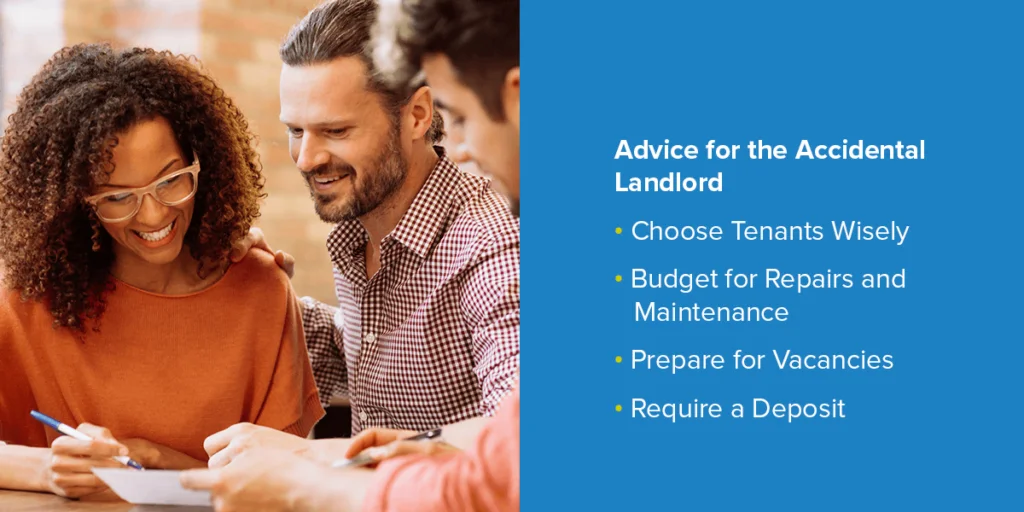Being a landlord comes with a lot of responsibility, whether working as a full-time or part-time landlord. While some people purposefully seek out the job, others fall into it.
Accidental landlords typically come into their role as property managers unexpectedly. When this happens, well-meaning friends and family may offer landlord advice. However, it’s essential to consider specific property management tips for landlords to help avoid common mistakes and make the most out of your new role.
What Is an Accidental Landlord?
Accidental landlords fall into the responsibility of owning a rental property out of the blue. A person may purchase a property, intending to live in it themselves before deciding to rent it instead. When they start renting out the rooms to tenants, they become an accidental landlord, in charge of collecting rent and maintaining the property like a traditional landlord. People who rent out the extra space in their own homes can even be accidental landlords.
How Does One Become an Accidental Landlord?
People can become accidental landlords through various scenarios, often before they even realize it’s happened. There are a few common ways you become an accidental landlord:
- A home is inherited, but you don’t want to live in or sell it.
- It’s too expensive to sell the house, so you bring in a renter.
- You experience a change with finances, making taking on a tenant the best solution.
Responsibilities of Accidental Landlords
Accidental landlords have many of the same responsibilities as traditional landlords, which can include:
- Screening tenants: Perform background checks on your tenants to ensure they are adequate renters with a quality history. Good tenants will pay rent on time and treat the property with care. They’re more likely to remain long-term tenants or recommend the property to other quality tenants if they have to move.
- Managing paperwork: A lot of record-keeping goes into managing a rental property to ensure you’re prepared for tax season and can handle any issues with tenants and their rental history.
- Scheduling maintenance and repairs: Part of a landlord’s responsibility is to ensure their tenants have working appliances. Keeping everything maintained sustains your reputation and encourages tenants to keep renting from you.
- Collecting rent: Collecting rent is essential to maintain the property, as these funds will cover maintenance costs and other necessities. Staying on top of rent collection each month is one of the primary responsibilities of a landlord.
- Handling evictions: Sometimes, tenants don’t stay up to date with their monthly payments and fall so far behind on rent that they must be evicted.
Some landlords rely on professional property management companies to handle these responsibilities, but this isn’t always an option for accidental landlords. Many people who become accidental landlords only rent to a single individual or just a few. So, instead of hiring a third party, accidental landlords will take on these responsibilities themselves.

Advice for the Accidental Landlord
Once you’ve taken on the role as a property manager, a few new landlord tips can help save you stress, money and more.
Choose Tenants Wisely
New landlords may be tempted to sign the first tenant that applies, but it’s recommended to exercise caution. Any potential renter needs to fill out an application, and as the landlord, you need to verify their references, work history and credit history.
A criminal background check also may be performed. If renting to family or friends, go into the tenant/landlord relationship with open eyes. You may be tempted to seal the deal with a handshake or verbal agreement, but it’s best to consider signing actual contracts.
Budget for Repairs and Maintenance
Every landlord should include general repairs and maintenance in their overall operating budget. This cost can be considered when determining what rent charges. In addition, you should do any maintenance and repair work professionally and quickly. Tenant law will dictate how long a landlord has to perform certain repairs.
Prepare for Vacancies
You won’t always be able to find a renter. Landlords need to expect vacancies and be prepared financially to deal with the loss of rental income. It can be helpful to add 8%-10% to the rental fee to cover vacancies and repairs.
Require a Deposit
Most renters expect to pay a deposit — a designated fee the landlord holds until termination of the lease. This money may be returned in full to the tenant if there’s no damage or violations of the rental agreement at the time of move-out. However, if needed, the deposit may cover repairs. It’s common for an additional deposit to be charged by the landlord if the tenant has pets.
Understand Legal Contracts and Obligations
The American Apartment Owners Association (AAOA) offers landlord advice and easy access to tenant laws in all 50 states. Tenant laws vary by state and protect both the landlord and the renter. It’s critical new landlords understand their obligations to prevent being sued by tenants.
The AAOA site has forms new landlords may find helpful, from basic rental agreements to a move-in/out checklist and late rent notices. It may be a good idea to consult with a legal professional when drafting your rental agreement.
All rental unit and property rules/regulations must be clearly stated, and clauses for repairs, damages, pets and late payments should be addressed.
Remember, when setting the rent price, finding a tenant may be more challenging if it’s too high for the area or the type of rental. This can cost more money over time.
Don’t Overlook Insurance
According to the Insurance Information Institute (III), if you’re planning to lease your home for longer than six months, you’ll likely need a landlord or rental dwelling insurance policy. These policies provide coverage for:
- Physical damage to the home’s structure by fire, wind, lightning, snow and other similar problems
- Damage to your personal property the tenant is allowed to use, such as the washer/dryer, appliances and items like a lawnmower
A landlord policy also has liability coverage for medical and legal expenses if the tenant or guest is hurt while on property. If your property is damaged and you can’t rent it out during the insurance-covered repairs, the policy may also cover this loss of rental income.
Your tenants should carry their own renter’s insurance that covers their belongings. As a landlord, you can set the lease to include a requirement for the tenant to have their own insurance.
Solutions for Accidental Landlords
If you’re having trouble as an accidental landlord, there are solutions to help you manage the responsibilities and become a better landlord to your tenants.
Detach Yourself From Your Home
If you’re an accidental landlord renting out a property you used to live in, try to detach yourself from your home emotionally. If you’re renting to a stranger rather than a friend or family member, it can be distressing to see someone living in your familiar space. If you decide to rent out your home and become an accidental landlord, treat it as if you are selling your home.
Your tenants have a right to their privacy, so you shouldn’t try to enter the home you’re renting without giving your tenants some notice beforehand, and it shouldn’t be for any other reason besides maintenance or emergencies.
Sell Your Property
Landlord advice can make a difference for the first-time property manager, helping avoid mistakes and costly problems. For some, taking on renters works great. However, it can be a time-consuming “job,” and there are many ins and outs to learning to be an effective landlord with a steady stream of rental income.
Accidental landlords can choose to sell their property instead. Selling on the market can help you get a fair market value for your property, but this can be challenging if you need repairs, upgrades or renovations. Instead, accidental landlords can sell their home as-is to a professional home buyer.
Relieve the Pressure of Managing Tenants and Get an Offer on Your Property
If you’re not ready to take on the challenges of being a landlord, it might be time to sell the property. Look to HomeGo for help with any property sale and leave the work to our team of professionals. With HomeGo, you can sell your property in as little as seven days, allowing you to pass on the responsibility of property management to someone else. We will buy your property as-is, so you don’t have to worry about making any repairs or renovations.
One of our experts can help guide you through the process. We’ll assess your property and give you a cash offer the same day. Once you accept, we can start the process to close the deal, allowing you to move on from the property as quickly as possible. Schedule a walkthrough today to get started.





